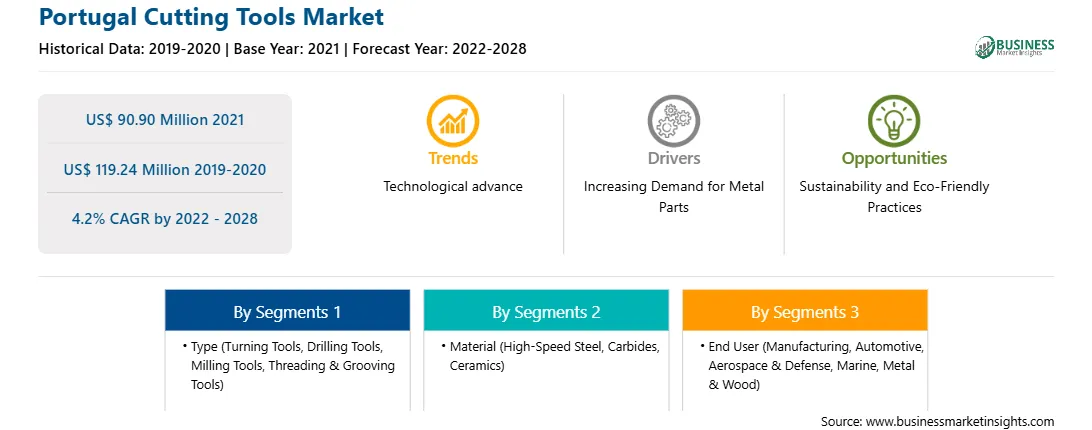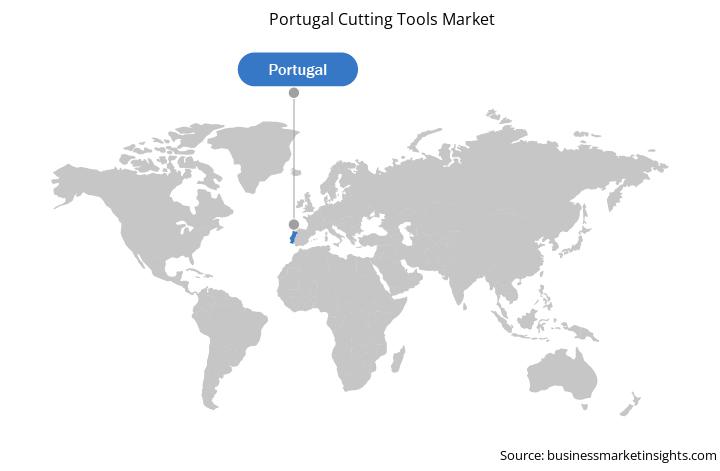High-speed steel (HSS or HS) is a type of tool steel frequently used as a cutting tool. It's commonly found in drill bits and power saw blades. HSS is becoming more popular as a cutting tool because of its properties, including high working hardness, durability, high wear hardness, and good hardness retention. Compared to previously used carbon steels, the adoption of HSS has boosted cutting speed by four times. Manufacturers are increasingly in need of efficient and dependable machining. HSS cutting tools are finding their way into mass manufacturing and high-temperature activities because of these properties. The increased emphasis on customer satisfaction and product quality supports the growth of the Portugal cutting tools market.
The demand for high-speed and dry cutting applications grows with the need for high-quality cutting tool materials. Several approaches have been tried to increase the machinability of alloys, such as the application of thin solid layers using sputtering techniques. However, such a system does not currently provide for the high-speed machining and green manufacturing requirements necessary for milling such materials.
The R&D promoters of proposals were involved in a successful exploratory project at UT Austin Portugal to develop a novel efficient green coating system with the ability to manage the release of a lubricious phase capable of improving the cutting performance of hard-to-machine materials. The coatings were deposited with a nanocomposite structure (TiN grains imbibed in a Si-N phase) and Ag in the form of nanoclusters equally dispersed in bulk, based on the TiSiAgN system. Thus, with a considerable reduction in the friction coefficient, the counterpart material's adhesion to the coating is avoided, preventing the growth of building edges, which frequently leads to cutting tool failure. The project began in April 2021 and will conclude by March 2023. The project's total eligible investment is US$ 79,173,600. Thus, increasing demand for high-speed cutting tools is driving the growth of the Portugal cutting tools market.
Impact of COVID-19 Pandemic on Portugal Cutting Tools
The COVID-19 pandemic has severely affected European countries, especially Portugal. In 2020, the Portuguese economy dropped by 7.6%, the largest annual loss since 1928. The pandemic boosted public debt by over ~€20 billion, bringing it to 133.7% of the national GDP in 2020, up from 117.7% in 2019. The government expected a budget deficit of 7.3% in 2020 and 4.3% in 2021. However, the government contained the rising unemployment due to the labor market recovery after the onset of the COVID-19 pandemic. The unemployment rate accounted for over ~6.5% in 2019, a drop of 8.7% in 2020, below the government's October projection. Moreover, the government enforced a second lockdown in January 2021 to combat rising COVID-19 cases, affecting the tourism, hospitality, and retail industries. The pandemic's influence on the banking & tourist industries will be largely determined by the duration of global travel bans and retail closures. According to the Automobile Association of Portugal (ACAP), automobile production in Portugal declined by 23.6% in 2020, with 264,236 vehicles produced in 2020.
The desire for factory automation drives the integration of smart manufacturing technologies in the manufacturing process and product development. Manufacturing is being driven by Industry 4.0 and the Industrial Internet of Things (IIoT), which combine physical production and operations with smart digital technologies. Industry 4.0 is associated with high-tech industries such as medical devices, aircraft, and computer technology because of its emphasis on interconnectivity, automation, machine learning, real-time data use, and artificial intelligence (AI). Smart tooling and smart machining are gaining tremendous attention as significant next-generation precision machining technologies, especially in Industry 4.0.
Based on type, the Portugal cutting tools market is segmented into turning tools, drilling tools, milling tools, threading and grooving tools, and others. The cutting tools market is expanding rapidly due to its widespread use in profit-generating industries such as automotive, construction, metal & wood, and power production.
Based on material, the Portugal cutting tools market is segmented into high-speed steel (HSS), carbides, ceramics, and others. Cutting tools market are used in various industries, such as construction, carpentry, automotive, and manufacturing, to perform various material cutting operations. The Portugal cutting tools market is growing with new and unique supplied standards.
Based on end user, the Portugal cutting tools market is segmented into manufacturing, automotive, aerospace & defense, marine, metal & wood, and others.
Players operating in the Portugal cutting tools market are mainly focused on the development of advanced and efficient products.
Strategic insights for the Portugal Cutting Tools provides data-driven analysis of the industry landscape, including current trends, key players, and regional nuances. These insights offer actionable recommendations, enabling readers to differentiate themselves from competitors by identifying untapped segments or developing unique value propositions. Leveraging data analytics, these insights help industry players anticipate the market shifts, whether investors, manufacturers, or other stakeholders. A future-oriented perspective is essential, helping stakeholders anticipate market shifts and position themselves for long-term success in this dynamic region. Ultimately, effective strategic insights empower readers to make informed decisions that drive profitability and achieve their business objectives within the market.

| Report Attribute | Details |
|---|---|
| Market size in 2021 | US$ 90.90 Million |
| Market Size by 2028 | US$ 119.24 Million |
| Global CAGR (2022 - 2028) | 4.2% |
| Historical Data | 2019-2020 |
| Forecast period | 2022-2028 |
| Segments Covered |
By Type
|
| Regions and Countries Covered | Portugal
|
| Market leaders and key company profiles |
The geographic scope of the Portugal Cutting Tools refers to the specific areas in which a business operates and competes. Understanding local distinctions, such as diverse consumer preferences (e.g., demand for specific plug types or battery backup durations), varying economic conditions, and regulatory environments, is crucial for tailoring strategies to specific markets. Businesses can expand their reach by identifying underserved areas or adapting their offerings to meet local demands. A clear market focus allows for more effective resource allocation, targeted marketing campaigns, and better positioning against local competitors, ultimately driving growth in those targeted areas.

The Portugal Cutting Tools Market is valued at US$ 90.90 Million in 2021, it is projected to reach US$ 119.24 Million by 2028.
As per our report Portugal Cutting Tools Market, the market size is valued at US$ 90.90 Million in 2021, projecting it to reach US$ 119.24 Million by 2028. This translates to a CAGR of approximately 4.2% during the forecast period.
The Portugal Cutting Tools Market report typically cover these key segments-
The historic period, base year, and forecast period can vary slightly depending on the specific market research report. However, for the Portugal Cutting Tools Market report:
The Portugal Cutting Tools Market is populated by several key players, each contributing to its growth and innovation. Some of the major players include:
The Portugal Cutting Tools Market report is valuable for diverse stakeholders, including:
Essentially, anyone involved in or considering involvement in the Portugal Cutting Tools Market value chain can benefit from the information contained in a comprehensive market report.